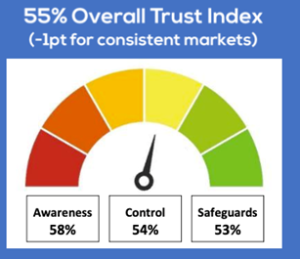This Industry Viewpoint was authored by Nicholas Rossman, Mobile Ecosystem Forum (MEF)
Trust in the mobile sector could be a lot better. The Mobile Ecosystem Forum’s (MEF’s) 2024 Consumer Trust Study reveals the Global Trust Index, at 55%, to be down one percentage point in like-for-like markets. While this might seem moderate, it underscores a concerning reality: for nearly half of mobile users worldwide, trust in data sharing is fragile.
 Delving deeper, we see that ‘awareness’ emerges as the strongest pillar of this index. This suggests that users are increasingly cognisant of how their data is being utilised. However, this awareness isn’t translating into a strong sense of ‘control’ or complete faith in the ‘safeguards’ in place. It’s a clear signal that while users are more informed, they still yearn for greater control and assurance regarding their data’s security. The 2021 study also echoes this sentiment, highlighting a significant gap between user expectations and the perceived performance of organisations in safeguarding data privacy and security.
Delving deeper, we see that ‘awareness’ emerges as the strongest pillar of this index. This suggests that users are increasingly cognisant of how their data is being utilised. However, this awareness isn’t translating into a strong sense of ‘control’ or complete faith in the ‘safeguards’ in place. It’s a clear signal that while users are more informed, they still yearn for greater control and assurance regarding their data’s security. The 2021 study also echoes this sentiment, highlighting a significant gap between user expectations and the perceived performance of organisations in safeguarding data privacy and security.
The Pandemic’s Impact: A Catalyst for Change
The COVID-19 pandemic has undeniably accelerated the adoption of mobile services, transforming smartphones into indispensable tools for everything from remote work and online education to entertainment and social connection. The 2022 study revealed a significant increase in mobile phone usage due to the pandemic, particularly in emerging markets like South Africa, Brazil, India, and China. This surge in usage has, however, been accompanied by heightened concerns about data sharing and privacy.
The Evolving Nature of Data Harms
As our mobile usage patterns evolve, so do the threats we face. The MEF studies have consistently tracked the prevalence of various data harms, from unsolicited messages and phishing attempts to account hacking and identity theft. While some harms, like unauthorised credit card use, have seen a slight decline, others, such as fraudulent texts and emails, have witnessed a worrying increase. This underscores the ever-present nature of cyber threats and the need for constant vigilance.
Data Protection Actions: A Growing Trend
In response to these threats, users are increasingly taking steps to protect their data. The 2023 study shows a rise in the adoption of various protective measures, including changing privacy settings, enabling multi-factor authentication, and using password managers. However, the effectiveness of these actions remains a concern. Many users still feel vulnerable despite their efforts, highlighting the need for more comprehensive and user-friendly data protection solutions.
Contrasting Experiences: A Closer Look at Five Markets
The global trends, while informative, mask significant variations across different markets. Let’s examine the experiences of users in the United Kingdom, the United States, Germany, India, and Brazil to gain a more nuanced understanding.
United Kingdon: A key trend in the UK market is the growing concern for personal data privacy and security, coupled with a perceived lack of control over data. UK users consistently rank privacy and security as important factors, but they feel that mobile apps and services are not meeting their expectations in these areas. This trust deficit has led to a significant proportion of UK users taking actions such as deleting apps, avoiding certain services, and refraining from making online purchases due to privacy and security concerns. Despite this, the proportion of UK users who feel in control of their data or believe that companies keep their data secure remains low. This contrast highlights a persistent challenge in the UK market: balancing the desire for digital engagement with the need for greater transparency, control, and security regarding personal data.
United States: American users have demonstrated a growing confidence in their ability to navigate the online world safely. This is likely attributed to increased awareness and access to cybersecurity resources. However, they remain wary of the extensive data collection practices of companies, indicating a growing demand for transparency and control.
Germany: German users, traditionally privacy-conscious, continue to express concerns about data security and potential misuse. The implementation of GDPR has fostered a sense of control, yet trust in organisations handling their data remains lukewarm. The 2022 study further emphasises this, revealing a higher level of negativity towards technological advancements and data sharing practices in Germany compared to other regions.
India: The Indian mobile landscape is vibrant, with rapid growth in smartphone adoption and internet connectivity. This digital surge has also brought about increased concerns about data privacy. The absence of a robust data protection framework exacerbates these concerns, leaving users feeling vulnerable and exposed.
Brazil: Brazilian users have been grappling with a surge in data harm incidents, leading to a decline in trust and a reluctance to share personal information. The introduction of LGPD (the Brazilian General Data Protection Law) is a step in the right direction, but its effectiveness in mitigating these concerns and fostering trust is yet to be fully realised. The 2022 study also highlights Brazil as one of the markets with the highest average number of data harms experienced by users.
The Role of Regulation and Education
Regulation and education are pivotal in shaping the future of mobile trust. Robust data protection laws, like GDPR and LGPD, can empower users and hold organisations accountable. However, their success hinges on effective implementation and enforcement. Additionally, promoting digital literacy and educating users about data privacy risks and best practices are crucial in enabling them to make informed decisions and protect themselves in the digital realm.
Looking Ahead: The Path to Empowerment
The journey towards a more trustworthy mobile ecosystem is ongoing. It requires a concerted effort from all stakeholders, including:
Industry: Companies need to prioritise transparency, user control, and data security in their practices and product designs.
Regulators: Governments need to enact and enforce robust data protection laws that safeguard user rights and hold organisations accountable.
Users: Individuals need to be proactive in protecting their data, educating themselves about privacy risks, and demanding greater transparency and control from the companies they interact with.
By working together, we can create a mobile ecosystem that fosters trust, empowers users, and enables the responsible and ethical use of data.
ABOUT THE AUTHOR
 Nicholas Rossman is the Anti-Fraud Programme Director at MEF (the Mobile Ecosystem Forum), a global trade body established in 2000 and headquartered in the UK with members across the world. As the voice of the mobile ecosystem, it focuses on cross-industry best practices, anti-fraud and monetisation. The Forum provides its members with global and cross-sector platforms for networking, collaboration and advancing industry solutions.
Nicholas Rossman is the Anti-Fraud Programme Director at MEF (the Mobile Ecosystem Forum), a global trade body established in 2000 and headquartered in the UK with members across the world. As the voice of the mobile ecosystem, it focuses on cross-industry best practices, anti-fraud and monetisation. The Forum provides its members with global and cross-sector platforms for networking, collaboration and advancing industry solutions.
Web: https://mobileecosystemforum.com/
X / Twitter: https://x.com/mef
LinkedIn: https://www.linkedin.com/company/mobile-ecosystem-forum
Facebook: https://www.facebook.com/MobileEcosystemForum/
If you haven't already, please take our Reader Survey! Just 3 questions to help us better understand who is reading Telecom Ramblings so we can serve you better!
Categories: Security · Wireless





Discuss this Post